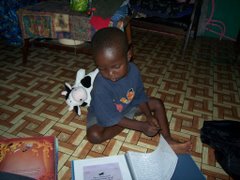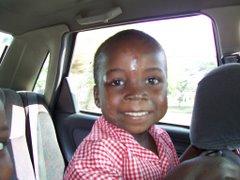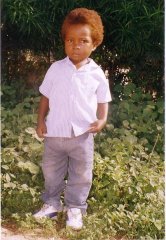I've realized that a lot of our friends and family may not know a lot about Ghana. I was asked the other day if when we go we'll try and go on a safari. Truth is, Ghana is in West Africa, no safari's there. Safari's are in East Africa mainly.
So here is everyone's first history lesson!!! LOL.
Fun Facts about Ghana
Full Name: Republic of Ghana (conventional long form: Republic of Ghana;
conventional short form: Ghana; former: Gold Coast)
Capital City: accrue
Area: 92,100 sq miles
Population:19,700,000
Languages: English (official), Ewe (other), GA (other), TWA (other)
Religion: Christian (60%), Muslim (15%), traditional African religions (25%)
Currency: cede (C)
Climate: tropical; warm and comparatively dry along southeast coast; hot and humid in southwest; hot and dry in the north.
Terrain: mostly low plains with dissected plateau in south-central area
Independence: 6 March 1957 (from the UK)
Flag description: Three equal horizontal bands of red (top), yellow, and green with a large black five-pointed star centered in the yellow band; uses the popular pan-African colors of Ethiopia; similar to the flag of Bolivia, which has a coat of arms centered in the yellow band.
Weather OverviewThe refreshing Gulf of Guinea breezes keep the coast a bit cooler than in the north with year- round high 20°C (low 70°F) temperatures the norm. Unless the slightly wetter months of May and June deter you, any time of the year is a good time to visit. In Northern Ghana, May to October sees the most rainfall while the other months have plenty of sun and high 30°C (high 90°F) days to cook under.
Government Type: parliamentary democracy
Government Leaders
John Agyekum Kufuor ~President (head of state and government)
Pre 20th Century History
Evidence of settlements along the Ghanaian coast dates back some 40,000 years, but it wasn't until the late 15th century, with the arrival of the Portuguese, that a written history of the area came into being. The Portuguese came in search of gold, which they found in abundance adorning the powerful Ashanti kings of the Akan people. The Portuguese soon began construction of several forts along what came to be known as the Gold Coast, where their plundered gold was shipped back to Europe as ingots. The real money, however, turned out to be in the slave trade, and the Portuguese traders' fortunes attracted the Dutch, British and Danes in the late 16th century. During the next 250 years, all four nations competed fiercely to control the trade, building forts and capturing those of rivals. The average yearly 'take' in slaves was 10,000, and by the 19th century, when the slave trade was outlawed, there were 76 forts dotting the coast, an average of one every 6km (4mi).
After the demise of slavery, the British took over the forts to use as customs posts, signing treaties with many of the local chiefs. The Ashanti profited handsomely from the arrangements, and their capital, Kumasi, began to take on all the trappings of a European city. The British grew increasingly uneasy with the tribe's wealth and influence, and when in 1873 the Ashanti refused to give up Kumasi, the British sacked the city and declared the Gold Coast a crown colony. Violent Ashanti resistance continued until 1900, when the tribe attacked the British fort at Kumasi, losing the battle but almost entirely destroying the city in the process.
Modern History
The British set out to make the Gold Coast a showcase African nation, allowing few Europeans to settle or even be employed there. Cocoa exports became the backbone of the economy, followed by gold, timber, manganese, bauxite and diamonds. By WWI, the Gold Coast was the most prosperous colony in Africa, with the best schools and civil service, a cadre of enlightened lawyers and a thriving press. Still, anti-British sentiments ran deep.
In the late 1920s, a number of political parties dedicated to regaining African independence began to emerge. In 1947, Kwame Nkrumah, the American-educated secretary general of the country's leading party, broke away from the group to form the Convention People's Party (CPP), aimed at the common person and pushing the slogan 'Self Government Now'. The CPP was an overnight sensation, and in 1949 Nkrumah brought the country to a halt by calling a national strike. The British responded by throwing him in prison, only to release him two years later after his party had won three general elections in his absence.
Independence finally came in 1957, making Ghana - the name chosen by Nkrumah after the first great empire in West Africa - the first black African nation to win freedom from its colonizers. For Ghana, it was the beginning of almost 25 years of economic decline. Nkrumah borrowed heavily to finance the country. His most grandiose project, the Akosombo Dam on the Volta River, didn't bring the electrification and irrigation programs it promised for more than a decade. By 1966, Ghana was 1000000000.00 in debt. Nkrumah's excesses and the rampant corruption among his officials led to a popular army coup that same year.
Between 1966 and 1981, Ghana suffered through six corrupt and incompetent governments, five of them military and each fostering resentment among Ghanaians. In May 1979, in the midst of serious food shortages, a group of young military officers led by Flight Lieutenant Jerry Rawlings staged another coup and began a series of 'house cleaning' operations that resulted in the sentencing and execution of several senior officers and former heads of state. Three months later, Rawlings' Armed Forces Revolutionary Council passed the reins to a civilian government following general elections, only to forcibly retake control two years later. Rawlings has been the head of state ever since. Military rule was formally brought to an end with the inauguration of the Fourth Republic on 9 January 1993, which was preceded by the adoption of a new constitution allowing political parties the freedom to organize.
Recent History
Popularly re-elected in 1996, President Rawlings oversaw Ghana's still-shaky economy move increasingly toward stabilization and the country itself solidify its commitment to democracy. In 2000, having reached the end of his two term limit, Rawlings stepped down as NDC leader. His deputy, John Atta Mills, was defeated at the polls by John Kufuor, leader of the New Patriotic Party (NPP). Kufuor, a mild-mannered, Oxford-educated lawyer known as the 'Gentle Giant', continued Rawlings' liberal economic policies and accepted a debt-relief scheme designed by the IMF. The subsequent removal of fuel subsidies sent petrol prices rocketing by 60%.
Despite this rocky start, Kufuor's party remains popular. In 2002 the president inaugurated a South Africa-style truth and reconciliation commission to look into human rights abuses committed mainly under Rawlings' military rule. It is alleged that some 300 people 'disappeared' under that regime.
So....how was that?!?!?!?!?! more later if you are all still hungry to learn...... I think it would be fascinating if we all knew as MUCH as possible about Brody's home land ~ it would mean so much to him, and to us if we all understood to the best of our ability where he is from.
Our family will be adding a new holiday to our years :-) We are going to start to celebrGhanaiannian Independence Day, 6 March (1957. We hope that next year you all can celebrate with us!!!!!
Love as always,
Julz, Scott & Brody
Thursday, October 05, 2006
Subscribe to:
Post Comments (Atom)




No comments:
Post a Comment